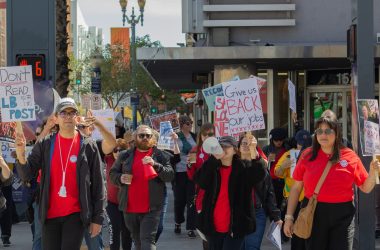Californians age 21 years and older can now legally buy, smoke and be in possession of recreational marijuana.
With 36 percent of precincts reporting at 10:46 p.m. Proposition 64, also known as the California Marijuana Legalization Initiative or the Adult Use of Marijuana Act, passed with 56 percent of votes, according to the Associated Press.
Although marijuana is illegal at the federal level, medical marijuana has been legal in California since 1996 with the passage of Proposition 215.
While possessing up to 28.5 grams of marijuana and eight grams of concentrated marijuana is now legal, smoking while driving and in public places remains illegal.
Proponents of the proposition, including Long Beach Mayor Robert Garcia, Los Angeles Mayor Eric Garcetti and Sen. Bernie Sanders, argued that legalizing marijuana will generate tax revenue and decrease law enforcement costs.
“Criminal justice reform is the main reason I [wanted it to] pass,” Christopher Banes, a junior history major said. “I don’t think anyone should be incarcerated for smoking something that comes from the ground.”
In addition to legalizing recreational marijuana, Proposition 64 also establishes two new excise taxes.
The first tax is a cultivation tax of $9.25 per ounce for the marijuana flower and $2.75 per ounce for marijuana leaves. Medical marijuana growers are exempted from this tax.
The second is 15 percent retail tax on marijuana, with prices being adjusted for inflation in 2020.
All money generated from the marijuana taxes will go to the California Marijuana Tax Fund, which will distribute money to marijuana research institutions, the California Highway Patrol as well as state and local health departments, among other places.
“I’m glad that [marijuana] is finally getting addressed,” Jesus Zavala, a junior sociology major said. “it seems like people want to be able to purchase marijuana without medical reasons and the taxes will be able to fund other things like education.”
Regulating marijuana now falls to Bureau of Marijuana control, formerly known as the Bureau of Medical Cannabis Regulation. It is charged with licensing and regulating marijuana businesses.
However, individual counties and cities will have the power to legislate where businesses can be located and can completely ban the sale of marijuana within their jurisdiction.
In Long Beach, medical marijuana dispensaries have been banned. However, under Long Beach Measure MM, which was passing with 56 percent of votes, up to 32 dispensaries will be allowed to operate within city limits.
While Proposition 64 had a large number of supporters, who raised over $22 million, some in the medical marijuana industry were not happy about the propositions passing.
“I work at a dispensary [and] we’re all against it,” human development major Clarissa Castañeda said. “[Proposition] 64 will hurt medicinal marijuana users and vendors… [it] will not fund schools, they’re going to use all the revenue to go into policing the shops.”
Although marijuana is now legal to smoke, licenses for business to sell it will not begin to be issued until around late 2017 to early 2018.
Amber Costa and Xochitl Abarca contributed to this story.
*All information comes from Ballotpedia.com, a nonprofit organization that provides nonpartisan information on American politics and elections.



